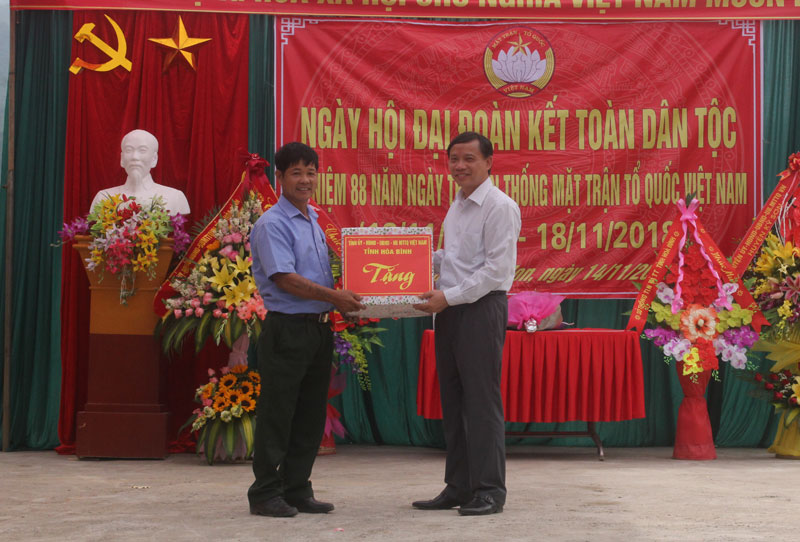
(HBO) – Vice Chairman of the People’s Committee of Hoa Binh province Bui Van Khanh joined a great national unity festival with people in Mon village, Phuc Tien commune of Ky Son district, on the occasion of the 88th traditional day of the Vietnam Fatherland Front (November 18, 1930 - 2018).
Mon village
is home to 99 households with 406 people, 98 percent of whom belong to the Muong
ethnic group. The population live in three residential clusters along the road
connecting Phuc Tien and Phu Minh communes.
Under the
leadership of the local Party committee, the VFF chapter in the village has
joined hands with local authorities, organisations and local people to efficiently
perform their tasks in socio-economic development, defence-security and the
campaign on building new-style rural areas and civilised urban areas in 2018.
Accordingly,
the poverty rate of the village stood at only 4 percent (4 out of 99 families) and
there is no family living just above the poverty line. The average income per
capita in the area is estimated at 30 million VND (nearly 1,300 USD) per annum,
an increase by 2 million VND from last year.
About 95
percent of the families received dissemination on policies and regulations,
while all households are connected to the national power grid. Around 90
percent of local roads were concretised, facilitating transport and economic
growth of the residential areas.
As a result
of the campaign on building new-style rural areas and civilised urban areas in
2018, 95 percent of local households earned the title "Cultural Family”, and
Mon village was recognised as a Cultural Residential Area.

Vice Chairman of the provincial People’s Committee Bui Van Khanh
presents gifts to Mon village in Phuc Tien commune.

Local families sign emulation commitments in 2019.
In
2019, Mon village sets itself the targets to win the title of Cultural
Residential Area for another year, as well as keep the ratio of cultural
families at 95 percent and raise average per capita income to 32 million VND
(1,370 USD).
On
the occasion, Phuc Tien commune presented the certificate of Cultural Family
for Three Consecutive Years to 49 families and the certificate of Cultural
Residential Area to Mon village./.
Phong Phu commune, Tan Lac district of Hoa Binh province, is widely regarded as the cultural heartland of the Muong ethnic group. Among its many traditional communities, Luy Ai hamlet (formerly Ai hamlet) stands out as a rare location where the customs and way of life of the Muong Bi people remain largely intact.
The Truong Kha temple festival, a distinctive cultural event held every three years in Vu Ban township, Lac Son district, returned recently with vibrant rituals and folk traditions of the Muong people. Located next to the Buoi River in the Muong Trao fields, the Truong Kha Temple is dedicated to the three Kun Dol deities, revered for teaching farming techniques, irrigation, weaving, and protecting the harvest.
The demand for spaces serving community activities of residents in various areas across Hoa Binh city has been satisfied as local cultural houses now feature modern, spacious facilities thanks to the effective implementation of Resolution No. 49/NQ-HDND issued on December 28, 2021 by the city People's Council, which approved the plan for reorganising, converting, and allocating land for the construction, repair, and expansion of cultural houses in Hoa Binh’s villages and residential areas until 2025.
At the end of May, the Hoa Binh Provincial Ethnic Arts Troupe organized a series of performances for residents in Region 2 and Region 3 communes across the province. Bringing art to ethnic communities in remote, isolated, and especially disadvantaged areas has become a meaningful activity. These are not merely artistic performances but also journeys to disseminate cultural values, enrich spiritual life, and contribute to preserving the cultural identity of ethnic minorities.




